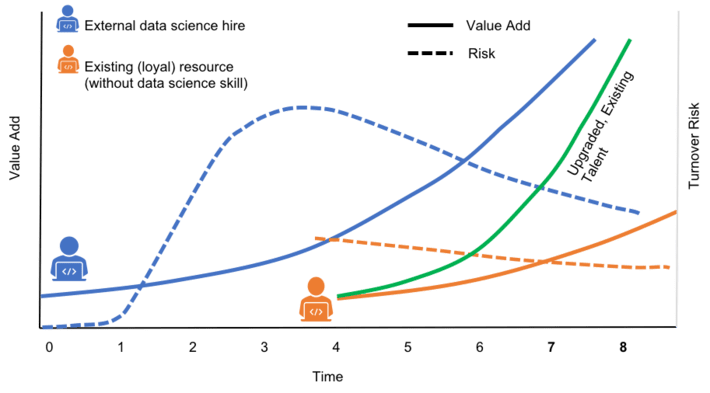Most of the big organizations are struggling with AI transformation. Data science projects are either taking too long to complete or would never get into production.
Among various reasons, the most common is the lack of a stable data science team. Due to high demand, the turnover rate is very high in data science, unfortunately. Data science managers or leaders typically go around this problem by focusing on the following:
- acquire best data science talent
- retain data science talent
- keep data scientists motivated
Unfortunately, the above recipe alone is not working for many businesses. In this article, we are going to discuss the types of available data science talent and how companies can fix high turnover by focusing on the training of existing internal resources.

3 Types of Data Scientist
There are three categories of data science talent in the market:
- Fresh graduates who have learned data science and machine learning but have not landed the first job yet,
- An experienced data scientist who has worked in the relevant industry for a couple of years, and
- Internal and external experienced in other fields but recently transitioned into data science.
Each category has its pros and cons. A hiring manager has to make a decision based on what is an immediate need of the organization. If you are in the middle of a project and need a replacement, probably a data scientist with relevant industry experience would be preferred. On the other hand, if the organization is at the beginning of your data science journey, then a mix of 3 types of data scientists might be more productive and economical.
Discovering Hidden Data Scientists
There is a hidden potential source of data science talent in each organization. That is existing but related talent in the organization i.e., business analysts, project managers, software developers, and data analysts. Most organizations haven’t paid much attention to leverage this talent by upgrading their skill set through basic data science training.
Established data scientists (who have a degree related to machine learning or AI) may disagree with this. Still, the matter of fact is that domain knowledge is as essential as technical data science expertise. You may be very good at scientific data science and machine learning methods and tools. Still, without an understanding of business processes and rules, it is almost impossible to add any value to the business. Also, the data science role is very cross-functional, and familiarity of an organization plays a vital role in success. Therefore, if existing talent gets upgraded, it is mutually beneficial for both business and talent.
Benefits For The Organization
In the short term, training of existing resources could help with the following;
- Improved communication among team members,
- Less need to hire new data scientists, and
- Sense of empowerment among existing talent
In the long term, the organization could benefit from following;
- Lower turnover rate, as existing talent is typically more loyal as it has been sticking around for a more extended time.
- Lower talent acquisition cost
- Increased quality of data science innovation, as upgraded existing talent, would have more profound business knowledge and with data science, the skill would be more effective to produce quality innovation
- Some of the upgraded talent may fall in love with data science and can learn further on their own and bring value to the organization.
About Author: Nasir Mahmood is a senior data scientist and consultant, with experience in the financial services industry.
